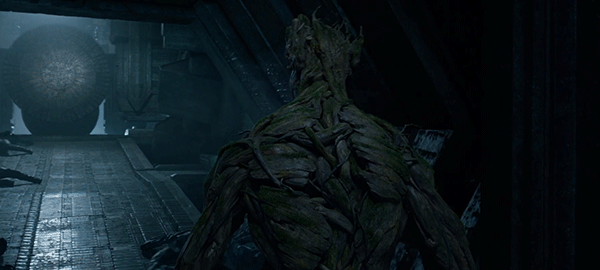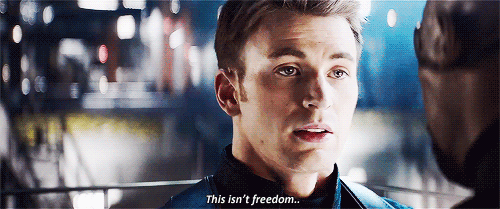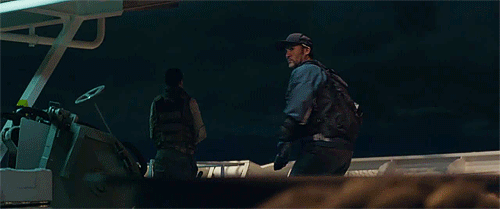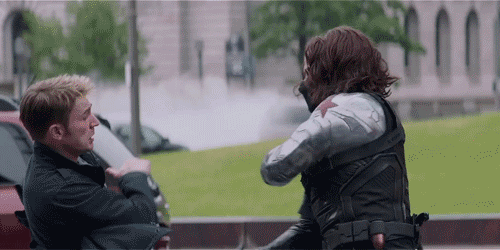We all have our own favourite Marvel film.
With Avengers: Infinity War being released this week, Marvel can rightfully kickback and watch the cash roll in because this epic adventure is the culmination of a decade's worth of hard work and planning. As stated in our
spoiler-free review of the Russo's latest blockbuster, the 19th film in the MCU does an excellent job of balancing action with memorable one-liners and gags.
Of course, everything started with Iron Man in 2008 - you can read about that
here - but with Infinity War landing in cinemas, every film fan will be debating over the best film in the MCU.
Deciding on a top 5 is an extremely difficult task - *truth be told, I'll probably change my ranking continuously* - but here's what I'm going for; 5) Spider-Man: Homecoming, 4) Avengers Assemble, 3) Thor: Ragnarok 2) Guardians of the Galaxy and the number one is....
 The Winter Soldier.
The Winter Soldier.
Here's why Captain America's second standalone adventure is the best film in the MCU.
The character
Let's be honest, Steve Rogers is a bit of a square. In Captain America: The First Avenger, we're introduced to him and we know that he's brave, loyal, heroic...yadda yadda yadda...but he's not much fun. In Avengers Assemble, he might be the leader of earth's mightiest heroes but it's clear that Tony Stark and The Hulk get all the laughs and action.
In fact,
during an interview for The Winter Soldier, the Russo brothers even admitted the same thing.
Joe Russo said: "I was a big comic book collector as a kid and Cap was not a favourite character of mine growing up. The issue I had with Cap is that I found him to be very square. So, our whole approach with Winter Soldier was 'how can we make Cap interesting to a comic book fan, who didn't love the character?'
Anthony Russo adds: "The first Avenger movie was very much a love letter to the golden age of the character...which is great. But we thought 'ok, now that he's gone away for the last 70 years and he's coming back to the modern world, he can be somebody different. He can decide to join the modern world."
To their credit, the writers and directors of The Winter Soldier realised that Cap just isn't that complex a character. Where the drama does lie though is placing him in a situation where his idealistic and unflinching views are challenged by what's developing around him.
In TWS, Captain America defies direct orders, goes against S.H.I.E.L.D and is actually a bit of a badass (more about that later). By taking this decision and updating the character to reflect more modern issues, all bets were off.
The Russo brothers understood that the character is only interesting when he's placed in a situation that can reflect very modern issues and concerns. Cap is still the same old-school idealist but his paranoia with the shady dealings of S.H.I.E.L.D is a great example of multi-film arc building.

The themes
Like any Marvel film, TWS is brimming with explosive action (more about that later too), beloved characters and star names, but the plot is actually very relevant to the modern world.
By touching on themes like the invasion of personal privacy, the erosion of civil liberties, increasing levels of weaponisation, an arms race that guarantees mutually assured destruction, the ominous threat of terror, lack of trust in government agencies, and shady government operatives that stage coups to implant their own ideology, TWS is arguably the most relevant Marvel film of the modern era.
After all, where else have we read about a massive company that's using people's personal data against their wishes in an effort to control, plan and potentially shape the future?
Aside from this, Cap's friendship with Sam Wilson (The Falcon) also touches on the issue of PTSD and the psychological hangups from war. Light and fluffy, it ain't.
The action.
Right from the off, we knew that Captain America in TWS was going to be a very different beast to what we saw before.
Cast your mind back to that scene when he jumps off the plane - without a parachute - to rescue those hostages that are being held on a S.H.I.E.L.D vessel by the mercenary Georges Batroc. With one kick, we knew that this modern version of Cap wasn't here to f**k around.

What unfolds on that boat really does the tone for what's to come because the hand-to-hand combat in TWS was brutal, kinetic and bone-shattering.
It's clear that Steve Rogers has mastered modern fighting styles but what's even more impressive is how the production team and choreographers incorporated Cap's shield and the use of knives.
This tiny sequence is still one of the coolest moments in the MCU.

Aside from these sequences, the Russo brothers also brilliantly mixed the old-school car chase formula with new school technology for Nick Fury's escape, and as for that elevator sequence when Captain America has to fight his way out of S.H.I.E.L.D headquarters, look at the choreography involved.
https://twitter.com/ChrisEvans/status/987052047739576320
https://twitter.com/ChrisEvans/status/987052240132288512
It's position in the MCU.
Before TWS was released, Marvel was at an important crossroads. Granted, Iron Man launched the MCU in spectacular fashion but the films that followed Jon Favreau's feature aren't exactly the best films in the MCU -
The Incredible Hulk (2008), Iron Man 2 (2010), Thor (2011), Captain America: The First Avenger (2011).
The next film in the MCU, Avengers Assemble, was a giddy thrill that Joss Whedon executed perfectly, but after Loki and the Tesseract were banished from Earth, we went back to finishing Tony Stark's trilogy with Shane Black's excellent Iron Man 3 and then we got Thor: The Dark World - the less said about that the better.
You can debate the merits of those two films, but something new was needed to collectively reunite the Avengers and that's HYDRA. Hail HYDRA!
The revelation that HYDRA has continued to exist within S.H.I.E.L.D was bold and incredibly clever because it meant that the MCU now had a continuing threat to S.H.I.E.LD and the Avengers.
It also gave us something bigger than just the one-and-done villains that we saw in previous films.
The Winter Soldier and the rest.
It's often said that the Marvel films have really struggled with villains and to a certain extent, they're right. Aside from the fact that he's one of the best killers and soldiers around, the decision to make Bucky Barnes the villain in TWS also allowed a far more interesting character arc for Captain America.
Of course, Bucky's blood-soaked history would ultimately tear the Avengers apart in Captain America: Civil War, but the battle lines were drawn here and The Winter Soldier is a relentless killing machine.
It also helps that the Russos were clever enough to cast Robert Redford as the film's main villain - the shady and twisted Alexander Pierce that was secretly one of HYDRA's leaders and its top undercover operative in S.H.I.E.L.D.
In terms of its stylistic and thematic influences, you can clearly see that the Russos watched a lot of political conspiracy-thrillers like The Parallax View, Three Days of the Condor, All the President's Men and The Conversation.
It's definitely not a coincidence that Redford was cast as the chief architect of Project Insight.
As for the remaining cast, it's great to see Black Widow actually put to good use and we also got more details about Nick Fury's relationship with S.H.I.E.L.D, Captain America and his mysterious past.
All things considered, we're pretty damn sure that The Winter Soldier is the best film in the MCU. Check it out on Netflix and then go and see Avengers: Infinity War.
*Actually, feck it! I change my mind. The best film in the MCU is...*


 The Winter Soldier.
Here's why Captain America's second standalone adventure is the best film in the MCU.
The Winter Soldier.
Here's why Captain America's second standalone adventure is the best film in the MCU.

 What unfolds on that boat really does the tone for what's to come because the hand-to-hand combat in TWS was brutal, kinetic and bone-shattering.
It's clear that Steve Rogers has mastered modern fighting styles but what's even more impressive is how the production team and choreographers incorporated Cap's shield and the use of knives.
This tiny sequence is still one of the coolest moments in the MCU.
What unfolds on that boat really does the tone for what's to come because the hand-to-hand combat in TWS was brutal, kinetic and bone-shattering.
It's clear that Steve Rogers has mastered modern fighting styles but what's even more impressive is how the production team and choreographers incorporated Cap's shield and the use of knives.
This tiny sequence is still one of the coolest moments in the MCU.
 Aside from these sequences, the Russo brothers also brilliantly mixed the old-school car chase formula with new school technology for Nick Fury's escape, and as for that elevator sequence when Captain America has to fight his way out of S.H.I.E.L.D headquarters, look at the choreography involved.
https://twitter.com/ChrisEvans/status/987052047739576320
https://twitter.com/ChrisEvans/status/987052240132288512
Aside from these sequences, the Russo brothers also brilliantly mixed the old-school car chase formula with new school technology for Nick Fury's escape, and as for that elevator sequence when Captain America has to fight his way out of S.H.I.E.L.D headquarters, look at the choreography involved.
https://twitter.com/ChrisEvans/status/987052047739576320
https://twitter.com/ChrisEvans/status/987052240132288512
